Solar energy is one of the hottest topics today when it comes to the various types of renewable and non-renewable energy sources. Solar power is one of the most popular renewable energy sources that can not only help reduce your carbon footprint, but can also save you money on your monthly energy bills.
Like any source of energy, though, solar energy has its associated pros and cons. We’ll take an in-depth look at those so you can make an informed decision as to whether solar power is right for your house.
Solar Energy and How It Works
This article is about the advantages and disadvantages of solar energy, but before we can get into those, it’s important to give a quick rundown of what exactly solar energy is, and also how it works. Check out our full length article on solar energy and power if you want even more in-depth information! https://convert-solar.com/what-is-solar-energy-complete-solar-power-guide/
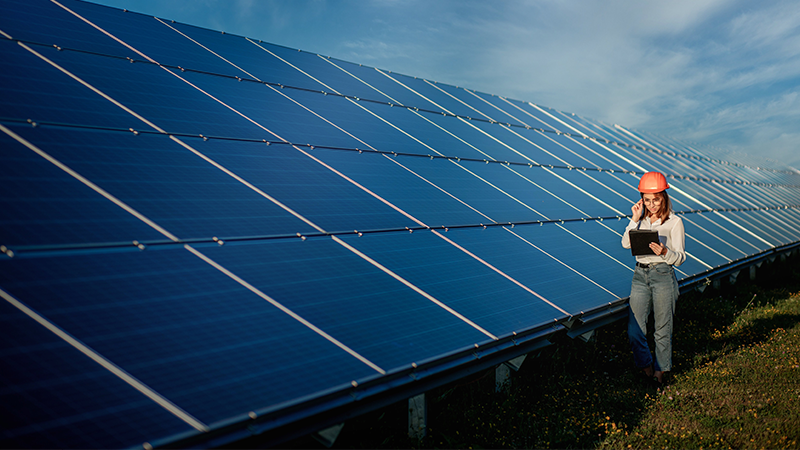
What is Solar Energy
Solar energy is the energy, or radiation, given off by the sun. This fact alone makes solar energy the most dependable and renewable of all the renewable energy sources. As long as the sun continues to exist, there will always be solar energy available to us to convert into usable forms of power.
Needless to say, solar energy is abundant, clean, and essentially endless. Renewable energy is a hot topic today, especially now, as we face global warming and climate change resulting in large part from excessive use of fossil fuels.
The Creation of Solar Energy
Solar energy is the byproduct of a process called nuclear fusion. Nuclear fusion is an extremely powerful reaction that is happening in sun’s core at all times. Hydrogen atoms collide and fuse, resulting in a reaction that produces helium atoms.
This type of nuclear fusion occurring in the sun’s core is also called the Proton-Proton Chain Reaction (PP reaction). The protons are essentially interchangeable with the hydrogen atoms. The only difference here is that the PP reaction results in truly unbelievable amounts of energy being released. This is the solar energy that makes its way to earth and that we can harness for our own use.
The energy we’re capturing is also known as electromagnetic radiation (or EMR). EMR travels in wavelengths and we recognize these as ultraviolet rays, gamma rays, X-rays, and infrared radiation. Though none of these rays are visible to the human eye, infrared rays are worth noting because these are the rays that produce the heat we can feel on our skin.
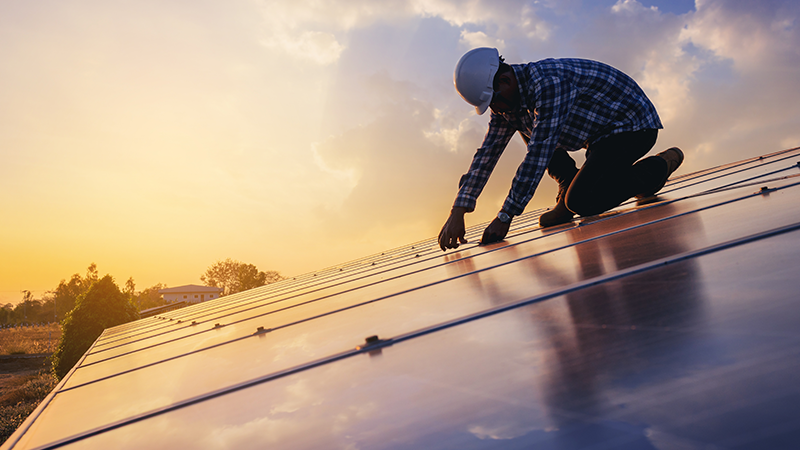
Solar Energy to Solar Power
Like we said, solar energy is abundant, renewable, and constantly available as long as the sun exists. However, the trick is to turn the solar energy into actual solar power. So what’s solar power? Simply put, solar power is when the sun’s energy is converted into electricity.
According to environmentalscience.org, there is “an estimated 173,000 terawatts of solar energy continuously hitting the Earth’s surface…[which is]…more than enough energy to meet the world’s current consumption levels of 15 terawatts per year”.
Solar Panels Allow Us To Use Solar Energy
So with all of this solar energy hitting the earth and being out there for us to use, the question becomes, “how do we harness it?”
On its own, solar radiation gives off heat and energy that’s usable by plants and animals. But in order for humans to use solar energy, we have to capture it and convert it into a useable form. The easiest way for us to do this is by using solar panels. But how would a solar panel capture solar energy?
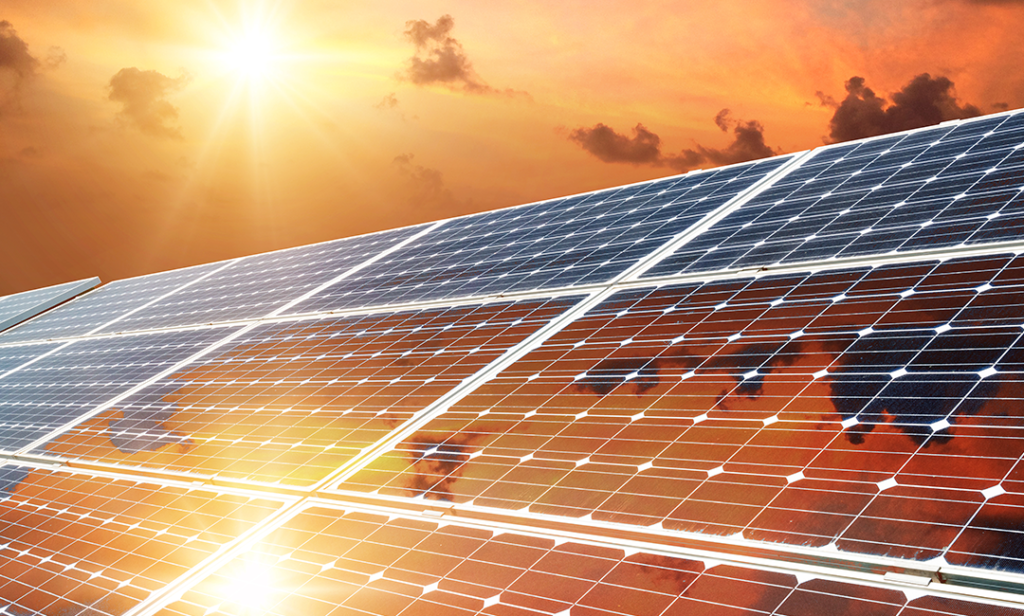
Solar Cells and the Photovoltaic Effect
Solar panels are made up of thousands of solar cells. These cells essentially capture the radiation given off by the sun, and then convert that radiation into energy. The solar cells are able to do this using a process called the photovoltaic effect. This is the physical and chemical process that “powers” all of our modern solar technology.
Solar cells are semiconductors which are basically materials that are really good at absorbing and converting solar radiation into electricity. After the solar cells have turned the solar radiation into electricity, that electricity is sent to a solar inverter.
Solar Inverters
The solar inverter’s job is to take that electricity and convert it to AC (alternating current), which is the current that most household appliances use. Once the electricity is converted to AC, the inverter sends it throughout your house.
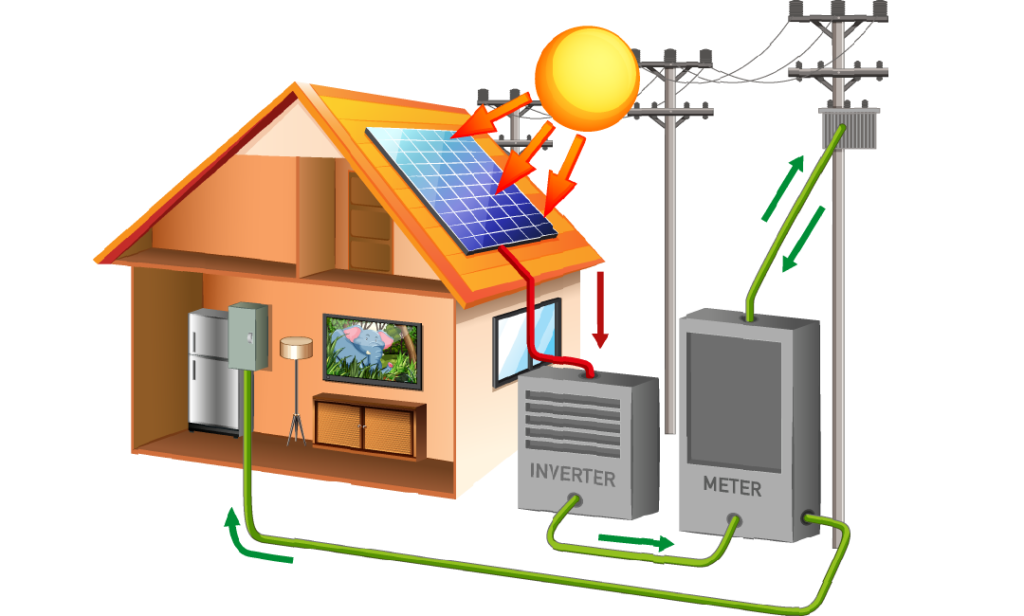
The Advantages of Solar Energy
In our opinion, the advantages of solar energy (and power) far outweigh any disadvantages. However, because the decision to go solar is such a big one, we want to give our customers as much information on the subject as possible, so that you can make the correct choice for your individual home and situation.
Solar Energy is Renewable
Probably one of the biggest advantages of solar energy is that it’s renewable. This means that it’s infinite; so long as the sun exists, there will be solar energy. Solar energy’s renewability really sets it apart because so many other forms of energy used by humans are finite.
Solar Energy Reduces Reliance on Fossil Fuels
Fossil fuels are finite forms of energy. The main examples of human-used fossil fuels are coal, petroleum, and natural gas. Fossil fuels are the byproducts of the breakdown of organic matter (primarily plants) over the course of millennia.
As the organic matter broke down and decayed, it got pushed further and further under the earth’s surface. There, it was exposed to extreme pressure and temperature, both of which caused the organic matter to turn into what we know as fossil fuels. It goes without saying that these materials took a long time to form, and as a result, the supplies are limited and finite.
Because human’s will never not need power and energy, it makes sense that we would need to look elsewhere for energy sources that are renewable. Hence, solar energy and power.

Solar Energy is Clean/Reduces Your Carbon Footprint
We know that solar energy is infinite, but another huge advantage is that it’s clean. By this, we mean solar energy isn’t producing the greenhouse gases that are the byproducts of burning fossil fuels.
When fossil fuels are burned, they release enormous amounts of pollutants into the air, all of which contribute to climate change, damage to the environment, and damage to our own health.
When you use solar panels to harness and convert solar energy, you can have full confidence knowing that your panels aren’t releasing anything harmful into the environment.
Another way in which solar panels are environmentally friendly is that their installation requires no mining, drilling, or water use. There are no buried pipes or cables required for a solar panel installation. Therefore there is less impact on your immediate environment.
Solar Energy Saves You Money
When you choose to go solar, you can opt to remain grid-tied, meaning that you’ll be powering your home with both solar energy and energy from the electric grid. You can also choose to go completely off-grid, meaning that your solar energy system will be responsible for all of your home’s energy needs.
Regardless of which option you choose – grid-tied or off-grid – having a solar energy system will save you money. Your monthly electric bill will either be greatly reduced, or even completely eliminated.
Oftentimes, your solar energy system will produce more energy than you’ll need for your home. In this case, you actually will end up selling that excess energy to the utility company, and then you’ll receive money back.
Solar Backup Batteries
Yes, buying and installing a solar backup battery system will add to the initial high purchase price of your solar energy system. However, backup batteries play a huge role in your long term saving.
Solar panels work during daylight hours since that’s when the sun is shining. This means that they’re constantly taking in the sun’s energy and converting it to usable power. As we mentioned, your solar panels will likely produce more power than your home will need.
This is where the backup batteries come into play. They store the excess power and you can then use it any time you need it, generally at night, or during especially terrible weather.
Tax Incentives for Going Solar
No matter where you live, there are tax incentives available for going solar. The tax breaks will vary depending on what state or country you live in, but regardless of your location, a tax break is a tax break!
In Virginia, a solar panel installation won’t be cheap. However, and this is huge, Virginia residents can expect to see a huge tax break, averaging close to $4,000 per year!
Solar Panels Have a Long Lifespan
Although the initial installation cost of a solar energy system is high, the long-term return on investment is huge. This is due in part to the fact that solar panels have an average lifespan of 25-30 years.
Solar panels are also relatively low maintenance, so as long as you keep tree branches, etc. clear of your solar system, you’re not going to have to constantly be buying expensive replacement parts, or even worse, and entire new system every few years.
Solar Energy Works in All Climates
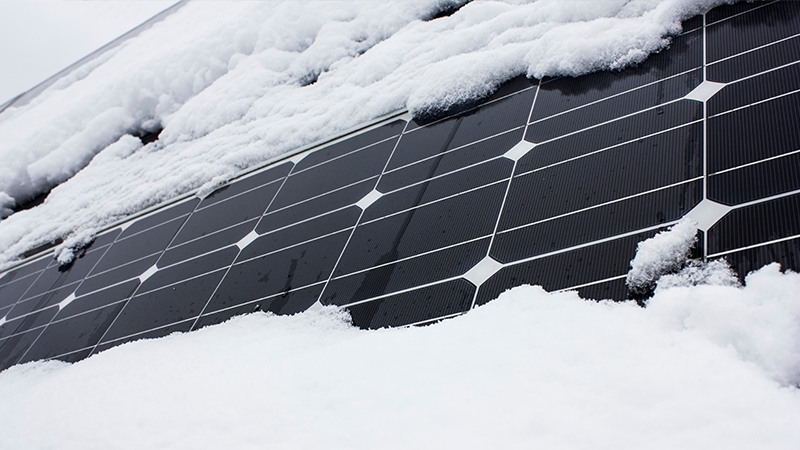
Solar energy works in all climates and in all parts of the world. One of the main questions we get at Convert Solar is, “but does solar power work on cloudy days?” Yes, it absolutely works!
The sun’s radiation can penetrate clouds, as evidenced by most of us having experienced a sunburn on a cloudy day. So regardless of if you live in a sunny, warm climate, or a cold, cloudy, rainy/snowy climate, you can still install solar panels and power your home with solar energy.
Solar Panels Increase Home’s Value
Simply by having a solar energy system installed, your home’s value will increase. When comparing two, almost identical homes, the home with a solar system will typically sell for around $15,000 more than the home without a solar system.
The value increase can also be a result of a cumulative amount of money saved over time, like on monthly electric bills and such.
Solar Energy Benefits the Economy
The solar industry is proving beneficial to the economy. This is due primarily to jobs being created. Solar panels need to be made; the panels need to be installed, serviced, etc. All of these processes require humans, which in turn boosts the local economy.
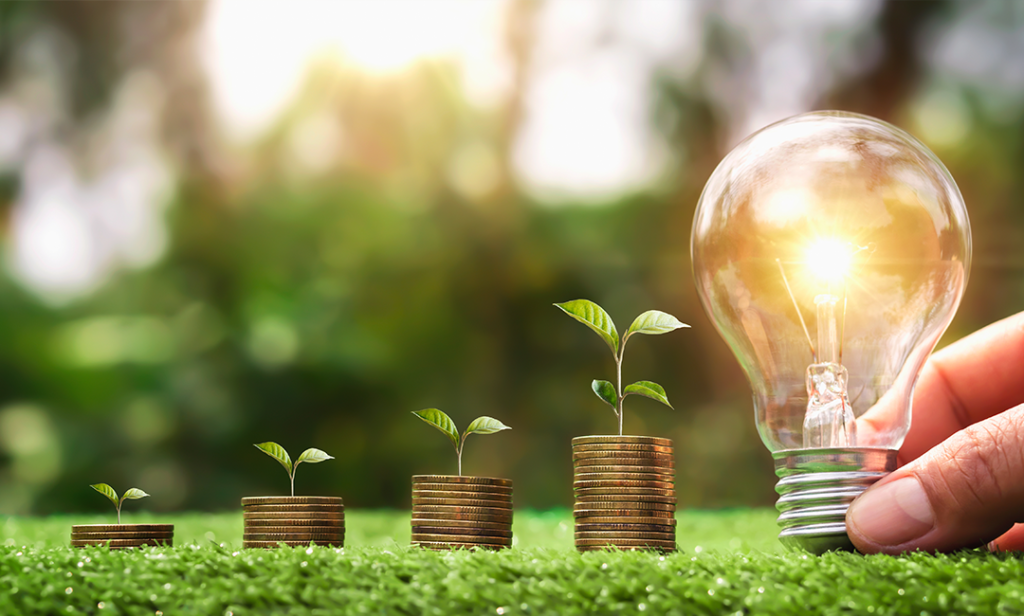
Solar Systems are Becoming More Efficient
The increased efficiency of solar energy systems is an important part. As the efficiency increases, the cost (purchase and even installation) will decrease. This in turn makes solar energy more accessible to more people around the globe.
The increased efficiency, decreased cost, and greater accessibility all mean we’re heading towards a cleaner way of powering the world, which in turn can help reverse (or at least slow down) the harm caused to the environment from the use of fossil fuels.
Disadvantages of Solar Energy
As we already mentioned, the advantages of solar energy far outweigh the disadvantages. But, as with anything, there are pros and cons, and we feel it’s important to give our customers all the information on both sides.
Solar Installation is Expensive
Purchasing, and then installing, a solar energy system is expensive. Solar panels aren’t cheap, especially if you go with ones that are middle-of-the-road or better, which is what you’d want in order to ensure panel longevity.
It’s important to hire qualified solar panel installers. Any highly skilled worker or technician will charge a higher fee, but again, we think it’s worth it when it comes to your solar system installation. You want to make sure that your panels are set up in the appropriate spot, and are properly secured.
High Cost of Backup Battery System
In order to get the most out of your solar energy system, you’ll want to buy a backup battery system. These aren’t cheap, but, just like your solar system itself, the backup battery system will end up paying for itself over time, both monetarily, and in terms of convenience and ease of use.
Solar Panels Aren’t Yet Mass Produced
The reason we’re listing this as a “con” is because mass production lowers costs. In order for mass production of anything to happen, there needs to be enough materials and technology to allow for said mass production, and subsequent cost reduction.
Although solar panels are becoming easier to produce, the materials and technology are slower to come along. This keeps the costs high, but over time, we’re seeing a gradual reduction in this cost.
Solar Panels Take Up Lots of Space
Whether your solar system is on your roof, your lawn, or in a field, it won’t be small. This means that you’ll need adequate space wherever you decide to have your panels installed. Unfortunately, some homes simply don’t have the space and therefore installing a solar system isn’t possible. Also, some rooves won’t meet the necessary criteria for rooftop solar panels.
Panel Sizes Needed Can Vary Greatly
The size of the solar panels you’ll need can, and will, vary greatly depending on your actual geographic location, and on the orientation of your home and roof. For example, if you live in an area with less sunlight, you might need to buy larger solar panels in order to maximize the energy taken in and power produced. This can increase your initial cost.
Solar Energy is Dependent on Sunlight
This isn’t as big a “con” as many people initially think. Like we said, solar power will absolutely work on cloudy or otherwise inclement days.
Your panels won’t produce as much energy and power as they would on a sunny day, however, they won’t stop working just because the sun is obscured behind clouds. You might see a slight decrease in amount of power produced, but that decrease isn’t enough to warrant deciding against going solar.
Your solar panels won’t, however, be able to produce power at night. But again, this isn’t a huge negative simply because you can either switch to using power from the grid, or the power stored in your backup batteries.
Long Permitting Process
You’ll actually need a permit from your local government office prior to being allowed to install a solar energy system on your home. As with any process involving permitting and government, this can be tedious and time consuming. However, the good news here is that most reputable solar companies will actually take care of the permitting process so that you won’t have to.
Now that you’ve read about the advantages and disadvantages of solar energy, we hope you’re feeling confident and more knowledgeable on the in’s and out’s of solar power, and ready to make the decision to go solar! Contact us today to get started!
